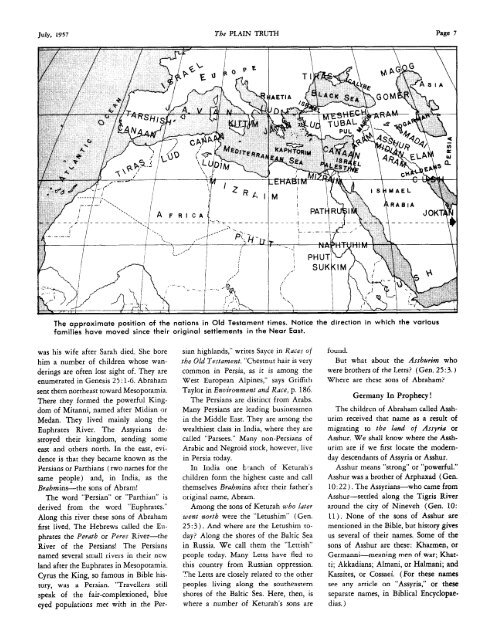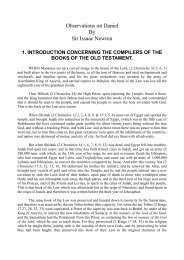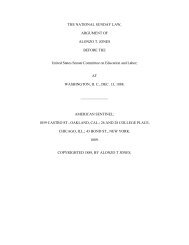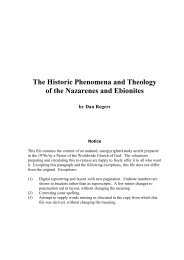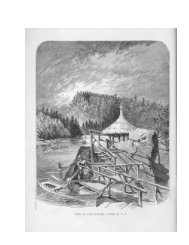Plain Truth 1957 (Vol XXII No 07) - Herbert W. Armstrong Library ...
Plain Truth 1957 (Vol XXII No 07) - Herbert W. Armstrong Library ...
Plain Truth 1957 (Vol XXII No 07) - Herbert W. Armstrong Library ...
You also want an ePaper? Increase the reach of your titles
YUMPU automatically turns print PDFs into web optimized ePapers that Google loves.
July, <strong>1957</strong> The PLAIN TRUTH Page 7<br />
The approximate position of the<br />
families have moved since their<br />
was his wife after Sarah died. She bore<br />
him a number of children whose wan-<br />
derings are often lost sight of. They are<br />
enumerated in Genesis 25 : 1-6. Abraham<br />
sent them northeast toward Mesopotamia.<br />
There they formed the powerful King-<br />
dom of Mitanni, named after Midian or<br />
Medan. They lived mainly along the<br />
Euphrates River. The Assyrians de-<br />
stroyed their kingdom, sending some<br />
east and others north. In the east, evi-<br />
dence is that they became known as the<br />
Persians or Parthians (two names for the<br />
Same people) and, in India, as the<br />
Brahmins-the sons of Abram!<br />
The word “Persian” or “Parthian” is<br />
derived from the word “Euphrates.”<br />
Along this river these sons of Abraham<br />
first lived. The Hebrews called the Eu-<br />
phrates the Pefatb or Pere, River-the<br />
River of the Persians! The Persians<br />
named several sniall riveis in their ncw<br />
land after the Euphrates in Mesopotamia.<br />
Cyrus the King, so famous in Bible his-<br />
tory, was a Persian. “Travcllers still<br />
speak of the fair-complexioned, blue<br />
eyed populations met with in the Per-<br />
nations in Old Testament times. <strong>No</strong>tice<br />
original settlements in the Near East.<br />
sian highlands,” writes Sayce in Races of<br />
the Old Testament. “Chestnut hair is very<br />
common in Persia, as it is among the<br />
West European Alpines,” says Griffirh<br />
Taylor in Enuironment and Race, p. 186.<br />
The Persians are distinct from Arabs.<br />
Many Persians are leading businessmen<br />
in the Middle East. They are among the<br />
wealthiest class in India, where they are<br />
called “Parsees.” Many non-Persians of<br />
Arabic and Negroid stock, however, live<br />
in Persia today.<br />
In India one branch of Keturah’s<br />
children form the highest caste and call<br />
themselves Brahmins after their father’s<br />
original name, Abram.<br />
Among the sons of Keturah who later<br />
went north were the “Letushim” (Gen.<br />
25:3). And where are the Letushim to-<br />
day? Along the shores of the Baltic Sea<br />
in Russia. We call them the “Lettish”<br />
people today. Many Letts have fled to<br />
this country from Russian oppression.<br />
The Letts are closely related to the other<br />
peoples living along the southeastern<br />
shores of the Baltic Sea. Here, then, is<br />
where a number of Keturah’s sons are<br />
the direction in which the various<br />
found.<br />
But what about the Asshurim who<br />
were brothers of the Letts? (Gen. 25: 3. )<br />
Where are these sons of Abraham?<br />
Germany In Prophecy !<br />
The childrcn of Abraham called Assh-<br />
urim received that name as a result of<br />
migrating to the land of Assyria or<br />
Asshur. We shall know where the Assh-<br />
urim are if we first locate the modern-<br />
day descendants of Assyria or Asshur.<br />
Asshur means “strong” or “powerful.”<br />
Asshur was a brother of Arphaxad (Gen.<br />
10: 22). The Assyrians-who came from<br />
Asshur-settled along the Tigris River<br />
around the city of Nineveh (Gen. 10:<br />
11). <strong>No</strong>ne of the sons of Asshur are<br />
mentioned in the Bible, but history gives<br />
us several of their names. Some of the<br />
sons of Asshur are these: Kharmen, or<br />
Germanni-meaning men of war; Khat-<br />
ti; Akkadians; Almani, or Halmani; and<br />
Kassites, or Cossaei. (For these names<br />
see any article on “Assyria,” or these<br />
separate names, in Biblical Encyclopae-<br />
dias. )


